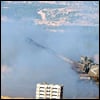I'm sitting here in my scrubbed basement office, surrounded by phone, fax, scanner, monitor, keyboard and assorted electronica, the clean hum of the PC's fan, and the newly painted walls. Thousands of miles away, another individual is surrounded by his gear, but the environment is significantly more grimy. He's a young American soldier proudly serving in C Company of the 501st Signal Battalion of the 101st Airborne Division, as a multi-channel systems operator/maintainer or something like that. As I write this, he's either manning his equipment in northern Kuwait, on the road to Baghdad, or in the thick of hostile southern Iraqi territory. By the time you read this, it's anyone's guess as to his location. He's my brother-in-law, Spc. Berel Keller.
As a teenage WWII buff, I devoured my high school library's collection on the years of battles and marching men, planes, ships, tanks and guns, and its flip side, the homefront — that amorphous entity of citizens, public servants, heavy hearts, hopes and fears, joy and sadness, care packages, last goodbyes, flag-waving mass send-offs, crackly radio reports, curt letters and that hovering, ominous cloud of uncertainty. I read all about it.
But now I'm it.
Now I'm one of those people in those old black-and-white photos — along with my wife and our two little girls aged 4 and 2, and her mother, six brothers, two sisters, and an assortment of uncles, aunts, cousins and close friends. I now know how those homefronters felt. They felt what I'm feeling now: emotional, detached, anxious, aloof, concerned, compulsive-news-reading. Trying to remember the last time Berel and I spoke. Thinking about his last visit. My wife's brother is out there in the sand somewhere. And we — his family and friends — are on the homefront. Rooting for him, hoping for the best, shutting out thoughts of the worst.
On the homefront, the internet is a blessing and a curse, bringing both relief and anxiety with its instant, up-to-the-minute, live streaming audio and video reports. The wives and children (and brothers-in-law) of the Greatest Generation had it easier, I think. They got the paper once a day and listened to the sporadic reports on the radio. No onslaught of rapidly changing information. I've been trying to avoid it, and yet am compulsively drawn to it. (Aren't we all?)
Homefronters want to know everything. The talk of the town at my regular synagogue is the latest news about Keller and three other neighborhood Hasidic soldiers in the Army — all of the same background, all in the Army, all in the 101st, all in Kuwait.
But they also don't want to know. "What if?" has got to be the question on the minds of all who know Berel Keller and his friends.
Here the lessons of history pick up where common sense leaves off. Yes, it's a blood relative, but no, one can't fall prey to the paralyzing effects of agonizing. So on the homefront, one does that one special thing they did in every day and age: nothing special at all. Going about your routine is one fine antidote to psychological pressure, I'm finding. WWII wives did it, families in Israel today continue to do it, and Jewish clans of Biblical times did it as the men of their houses marched off to battle against the Goliaths of their day.
And prayer.
So what's it like being on the homefront? A little more stressful. A lot more personal. I go about my day as most of us do, trying to get things done. But mostly, I try to let go and let G‑d. To trust in G‑d. To pray. I've been praying for Berel and his comrades in arms every day now, adding a personal petition in the Shma Koleinu prayer in morning services. Being on the homefront can weigh down on you. Prayer, I've found, lifts that weight from the shoulders.
I trust that Berel knows what he's doing. I trust the United States Army and the training they gave him. If I were to guess his thoughts at this time, I daresay he's not consumed with self-concern. He's a soldier. He's tough. He's trained to handle whatever will come his way. Beyond that, he's in G‑d's Hands.
And so are we back here on the homefront. Those stalwart-looking American citizens and public servants in those history books did not survive the pain of separation because they possessed rare strength. They were ordinary people. And they coped by doing the ordinary, healthy things that history has shown to be most effective: they cooked, they cleaned, they laughed, they went about their day. And they prayed.
Author's note: Letters of support to Spc. Keller are welcome and will be forwarded to him at the earliest opportunity.






Join the Discussion